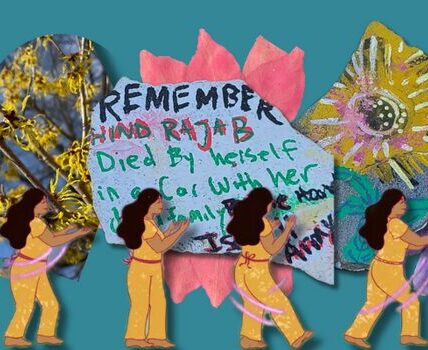“Toy Boat,” by Ocean Vuong
yellow plastic
black sea
eye-shaped shard
on a darkened map
no shores now
to arrive — or
depart
no wind but
this waiting which
moves you
as if the seconds
could be entered
& never left
toy boat — oarless
each wave
a green lamp
outlasted
toy boat
toy leaf dropped
from a toy tree
waiting
waiting
as if the sp-
arrows
thinning above you
are not
already pierced
by their own names
We are coming into spring here in the Northern Hemisphere and while spring is a season of celebrating increasing daylight, blossoming flowers, and a flurry of sentient life, in this moment, we are heavy with the wars being waged in Ukraine and around the world, anniversaries of past violence—such as the murders of Asian spa workers Delaina Ashley Yaun, Xiaojie Tan, and Daoyou Feng, as well as Paul Andre Michels on March 17, 2021—and the enduring challenges of the pandemic. But spring also brings an opportunity to celebrate our trans friends, family, and community during Trans Day of Visibility and Trans Week of Action. So like all times we grieve, we rejoice, and we live into loving-kindness as the essential practice for being in a complex, even chaotic, world with one another.
At Change Elemental, we have been deepening our practice of loving-kindness—with ourselves, with each other, and with our clients, partners, and broader communities. Some of these practices are as simple as slowing down, taking longer breaks, and breathing with one another instead of rushing into “doing the work” whatever the important work is. Other areas are more formal and have us aligning our values and our organizational guidelines so that we hold one another in accountability and love.
These efforts have included taking a closer look at our personnel policies, which seems obvious enough. As an organization focused on intersectional race equity and liberation, we should always be reflecting on how our practices, priorities, and decision-making are impacting the wellbeing of our team. And yet, like many organizations, we historically operated with personnel policies that were developed decades before, largely driven by risk-averse legal advice, and used primarily as an onboarding document for new hires. Once finalized, most personnel policies—including ours—are rarely revised.
As we began our intentional culture shift to one of greater leadership and power-sharing, we made a few piecemeal edits here and there but continuously put off looking at the whole thing. We share this because the time it took us to embark on this endeavor reflects the fact that based on our small size, we didn’t have the resources to really staff the people aspect of the organization—often referred to as Human Resources—and we were prioritizing other internal efforts and external engagements over our own wellbeing as a team. The pandemic put this choice into stark relief and our emerging multi-person shared leadership structure supported a collective intervention. In the chaos of the pandemic, it became clear that a complete review and revision of our policies was part of the work needed to more fully realize our vision of love, dignity, and justice today—to show up resourced, with care, and in our purpose to advance our vision.
Holding Equity & Care at the Center
Our new-ish Pad structure (more on our shared leadership structure and practices here) supported this deep dive into our personnel policies. The Human Sustainability Pad—consisting of staff from across our consulting, finance, administration and operations, and communications teams—designed and implemented the effort to synthesize staff feedback regarding the impact of our policies on their own sustainability and identify priority shifts that needed to be made.
The Pad began the process by reframing the language and purpose of our personnel policies, shifting from setting employee expectations and agreements to inviting, celebrating, and supporting all of our team members. Most of us hadn’t looked at the policy manual for so long we were shocked to find language like, “The provisions of the manual have been developed at the discretion of management and, except for its policy of employment-at-will, may be amended or canceled at any time, at [our] sole discretion.” This kind of language frames the relationship between the human being and the organization (as a god-like entity) as one of submission and control and has not been in alignment with our values for many, many years. However, in the past, we had simply sucked it up when legal counsel advised us to make sure the power relationships were clear and the “institution” was protected. So, while we may not have practiced this way of being, it was guiding our structure and organizational psyche. It wasn’t until we were living through multiple pandemics, where the most basic aspects of survival were challenging at best, that we amped up our rejection of such framings and the ways they impacted our experiences as a team. So, our new personnel policy frames the content of the document in this way, “One of our core objectives is to create a work environment that is conducive to both personal and professional growth… This manual describes many of your responsibilities as an employee and outlines the programs developed by Change Elemental to benefit its team.” It’s still a little awkward, but we are moving in the right direction.
Beyond language and framing, we made some fundamental changes to employment categories—specifically part-time and full-time positions. Due to our small size, we had, on occasion, hired people at less than 50% time. There are certainly times when less than 50% time employment works well for people. But, we realized there were two ways this kind of hiring was not in alignment with who we are and how we work. First, we do not offer prorated benefits for people who work less than 50% due to a host of reasons including financial resources, insurance practices, and IRS regulations. Second, we are a highly relational organization that spends an important amount of time focused internally on deepening practices of the elements of transformation (such as shared leadership, inner work, and collective learning and practice), and when team members work less than 50% time it makes it hard for them to meet their role’s objectives, be engaged in this critical internal work, and have space for their own growth. When COVID hit, we found ourselves in a position where one of our team members who worked less than 50% time wasn’t accruing sick time, wasn’t being reimbursed for office supplies and didn’t have access to a number of other benefits. While we quickly pivoted and extended as many benefits as we could, our ability to support our team member’s well-being, and their capacity to participate fully in the breadth of our work, was not sustainable. So we committed to not creating any more positions at less than 50% time.
Now that we had cleared up our employment categories, we looked at all our benefits, especially ones that had not previously been offered to part-time team members (some had been provided on a prorated basis to part-time staff). Here are some key changes we made based on the feedback we received:
- Sabbaticals: Our sabbatical policy (first developed in 2015) provides six weeks of leave every five years (with the ability to add two weeks of vacation pay), and was previously a benefit for only full-time employees. We have since extended sabbatical leave to include employees working 75% time or more—they are eligible for sabbatical leave when they have worked the equivalent number of hours as a full-time employee would have after five years.
- Parental leave: Parental leave has been extended to part-time staff and can be used after one year of employment with Change Elemental (this was reduced from two years). Staff are provided 16 weeks of parental leave (eight weeks paid and eight weeks unpaid). Available vacation hours, comp time, and up to 50% of available wellness time can be used during the period of unpaid leave. Previously, staff were not able to add wellness time unless it was specifically for an appointment with a healthcare practitioner. We also offer short-term disability insurance to support in offsetting the unpaid time off.
- Retirement plan: Change Elemental’s 403b plan is now extended to all staff, including part-time. The 403b is funded at 5% by the organization.
- Health insurance: Health insurance has been extended to all staff, with part-time employees paying for a pro-rated amount.
In addition to adjustments in employment benefits, we revised our work schedules to include a paid thirty-minute lunch for everyone working an eight-hour day (full- and part-time). For those of us who had never planned out a lunch break, the invitation to set aside thirty minutes of paid time for a break was a revelation.
We also added two additional holidays—honoring Indigenous People’s Day and Juneteenth—to our existing paid holidays schedule. As so many holidays celebrate the colonization of this land and the subjugation of Black and Indigenous people (Washington’s Birthday, Independence Day, Thanksgiving, etc.) it was important for us to honor Black and Native peoples and legacies.
As an organization that has been working virtually for over a decade, we already had benefits in place to cover the cost of internet and office supplies. However, we had monthly limits on office supply expenses that precluded the purchase of more expensive items such as ergonomic office chairs, lamps, desks, etc. By removing the monthly cap on reimbursable office expenses and approving purchases within an annual spending limit, our team has been able to procure comfortable chairs, computer monitors, and desk lamps making our office set-ups more supportive for our bodies and what we are trying to accomplish (and this was done at no additional cost to the organization).
These changes have had immediate effects on people’s ability to care for themselves and their families, and to be resourced in this work. Of the new parental leave policy, Alison Lin shares “The updated parental leave policy allowed me to ease back into work at three days a week; I was excited to be back and also was only sleeping three-hour chunks at night so the abridged schedule meant I could pay attention to my new kiddo, our clients, and the dishes.” Natasha Winegar, who for many years worked 85% time in order to care for her children, and wouldn’t have qualified for a sabbatical under our previous policies, is now planning her first sabbatical this summer. She shares, “After nine years at Change Elemental, I am looking forward to having time and spaciousness to rest, refresh, and deeply connect to myself and my purpose.”
Experimenting Towards Rest & Rejuvenation
Beyond these permanent policy changes, we have embarked on a number of experiments—meaning time-bound and the source of ongoing learning and reflection—to even more robustly support our team. These experiments have been intended to support the health and well-being of our team over the last few years.
- Additional weeks off*: In 2020/2021, Change Elemental closed for a week for Juneteenth and also for the week between Christmas and the New Year. For the 2021/2022 fiscal year, we have allocated extra days off to leverage already existing three-day holiday weekends into four-day weekends and provided three-day weekends where there were no holidays.
- Unlimited wellness time: In the early stages of the COVID-19 pandemic and into the summer of racial uprisings, we offered staff unlimited wellness time to support the health and well-being of our team. After 4 months, we went back to our standard wellness time practice. Beginning in January 2022 and extending through the spring, we again instituted an unlimited wellness leave.
- No work Fridays during summer: In an effort to allow for additional wellness and mental health, in 2021, Change Elemental was closed on Fridays during the summer months.
Since these experiments in team well-being, staff members have shared the ways in which these shifts made in real-time have supported them to care for themselves and their families during challenging moments that surface, which personnel policies are not typically designed to address. Naima Yael Tokunow shares, “Unlimited COVID wellness time supported and protected my family’s health and my own capacity and boundaries during shortened school weeks and mandated school closures due to COVID, allowing for me to do childcare without juggling work responsibilities.” The practice of implementing experiments that can augment our personnel policies has given us the spaciousness to support the needs of our team and resource folks while navigating complexity and emergence within our broader context. The Human Sustainability Pad, working with our other Pads and Leadership Hub, is continually sensing what is working, and what else might be needed to support our team’s well-being.
Like many other organizations, we are still shedding the habits of white supremacy that have us exerting organizational power over the human beings that make it up. And we are continually learning how to balance our mission and vision, fiscal sustainability, and human care and sustainability.
This is an ongoing journey. On the horizon, we plan to deepen our equity and liberation practices with new approaches to equitable compensation. As always, we will share what is emerging and what we are learning in the process.
*Read more about this experiment here.
Banner image credit: Alison Lin





